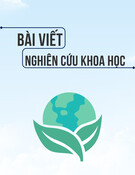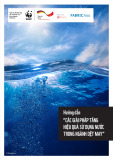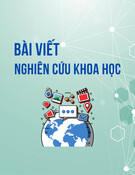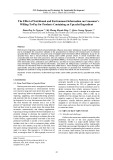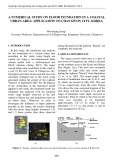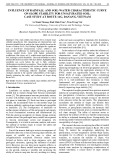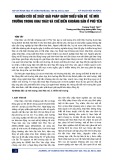227
JOURNAL OF SCIENCE AND TECHNOLOGY DONG NAI TECHNOLOGY UNIVERSITY
Special Issue
CONSUMER BEHAVIOR AND SUSTAINABILITY IN THE ONLINE FOOD DELIVERY INDUSTRY: A COMPREHENSIVE REVIEW (2015-2024)
Nguyen Thi Thuy Duyen1, Huynh Thi Thuy Loan1, Nguyen Le Ha2, Huynh Kim Phung2*
1Dong Nai Technology University 2HUTECH University *Corresponding author: Huynh Kim Phung, hk.phung@hutech.edu.vn
GENERAL INFORMATION ABSTRACT
Received date: 13/04/2024
Revised date: 21/05/2024
Published date: 26/07/2024
KEYWORD
Behavior,
Consumer,
Sustainability, perceived value, and Online food delivery
is an increasingly are
insights for
The rapid growth of the online meal delivery industry, which is expected to reach USD 133.7 billion by 2026, has dramatically altered consumer behavior and market dynamics. This research investigates the changing consumer behavior toward online meal delivery services, with a specific emphasis on sustainability issues. This study conducts a comprehensive assessment of literature from 2015 to 2024 to analyze the variables influencing customer decisions, the impact of online reviews and ratings, consumer preferences for sustainable practices, and the sustainability practices used by the online meal delivery industry. Our findings indicate that, while technological convenience, advancements continue to influence consumer purchases, increasing emphasis on environmental there favoring sustainability. Consumers sustainable food delivery methods, such as eco-friendly packaging and local sourcing. Meanwhile, the industry is reacting with innovations to reduce its environmental impact, such as biodegradable packaging and efficient delivery routes. This study emphasizes the necessity of connecting corporate practices with consumer expectations for sustainability, researchers, policymakers, and providing practitioners seeking to promote environmentally friendly innovation in this rapidly increasing area.
1. INTRODUCTION
Intelligence, 2023). The digitalization of the food sector has fundamentally altered how consumers order meals, promising enhanced convenience, accessibility, and choice for customers (Peng et al., 2023). Understanding consumer behavior and emotions has become
The online food delivery market has expanded rapidly in recent years. The global market is estimated to reach USD 133.7 billion by 2026, representing a 9.6% compound annual growth rate (CAGR) over 2021 (Mordor
228
JOURNAL OF SCIENCE AND TECHNOLOGY DONG NAI TECHNOLOGY UNIVERSITY
Special Issue
studies have highlighted
this backdrop,
and ratings are effective methods for increasing trust and influencing potential buyers (Wang & Somogyi, 2018; Kim et al., 2016). The use of advanced analytics and machine learning has allowed for more personalized products based on individual tastes and purchasing histories. Gamification techniques have also been used to increase consumer engagement by offering awards and interactive aspects to encourage repeat business (Bitrián et al., 2021; De Canio et al., 2021). These advancements highlight a move toward more engaging and interactive consumer experiences, which use technology to not only meet but anticipate consumer wants (Arshad et al., 2015; Mitra & Debnath, 2023).
3. FACTORS INFLUENCING CONSUMER DECISIONS
insights
into
value,
crucial for establishing a competitive advantage in this ever-changing industry (Saad, 2021). the Previous significance of service quality, meal diversity, and food safety in determining customer satisfaction and loyalty (Ali et al., 2023). However, environmental sustainability has become a critical issue for corporations to solve (Cheng et al., 2022). Growing worries about packaging waste have prompted the food delivery business to embrace more ecologically responsible procedures (Arunan & Crawford, this paper 2021). Against provides a thorough evaluation of academic research on online meal delivery and related customer perspectives from 2015 to 2023. The purpose of this study is to critically assess significant shifts in customer attitudes and sustainability concerns in this industry. This will provide scholars, policymakers, and practitioners with valuable theoretical and practical fostering environmentally friendly innovation in the rapidly increasing sector in a timely manner that is consistent with customer psychology.
2. CONSUMER BEHAVIOR IN THE ONLINE FOOD DELIVERY INDUSTRY
Technological
industry,
dramatically
to enhance order
innovations and mobile applications have transformed the online food delivery altering consumer expectations and behaviors. This transition is mostly due to improved user interface design, tailored experiences, and the influence of social proof on customer decisions (Sia et al., 2024). According to research, app usability and aesthetic appeal are important factors in customer satisfaction and loyalty (Shankar et al., 2017; Lee et al., 2019), while recommendations have been personalized proven frequency by improving the user experience (Riegger et al., 2022; Jusuf, 2023). Furthermore, user reviews
Building on Jawabreh et al. (2023), this section investigates the factors influencing consumer decisions for online food delivery, with a focus on sustainability (Li et al., 2020). and Perceived convenience, responsible activities all environmentally influence preferences and loyalty. The importance of sustainability and ethical behaviors in brand loyalty is becoming more widely recognized (Kim & Johnson, 2016; Mahajan et al., 2023). Convenience is still an time savings and important factor, with simplicity of use impacting preferences (Vatamanescu et al., 2017; Prasetyo et al., 2021). Perceived value, which includes quality, price, and service satisfaction, is critical for driving loyalty (Suhartanto et al., 2019; Hong et al., 2023). Eco-friendly activities have a favorable impact on decisions, matching the growing trend of supporting sustainable firms (Sia et al., 2024; Chen and Lee, 2022). Furthermore, social factors like word-of-mouth and internet reviews have a significant impact on customer behavior (Schwichtenberg, 2015; Jun et al., 2021). Technological developments
229
JOURNAL OF SCIENCE AND TECHNOLOGY DONG NAI TECHNOLOGY UNIVERSITY
Special Issue
According
and personalized marketing improve user experiences and influence decisions (Roozen and Raedts, 2018; Su et al., 2022). This complicated consumer landscape underscores the importance of taking a comprehensive approach to meeting and understanding the changing demands and preferences of online meal delivery service users (Al-Youssef, 2015; Hoang & Le Tan, 2023).
4. IMPACT OF ONLINE REVIEWS AND RATINGS
reviews
their
for
reviews
jeopardizes
for
(Nagar,
to surveys, consumers are increasingly interested in sustainable food delivery options such as eco-friendly packaging and local sourcing, despite the continued importance of pricing, punctuality, and quality. Young customers enjoy the combination of sustainability and convenience (Kowalska et al., 2021). Increased environmental awareness transparency and is driving demand for sustainable practices in supply chains (Joshi & Rahman, 2015; Ali et al., 2021), with customers willing to pay extra for environmentally friendly items. Local sourcing is emphasized for its dual benefits of lowering carbon footprints and boosting local economies (Sander et al., 2021; Haines, 2021), while innovations such as biodegradable packaging are gaining popularity low environmental impact (Lakatos et al., 2021; Alamsyah et al., 2020). Digital platforms that promote sustainability have a substantial impact on consumer choices, highlighting the technology and sustainable link between practices (Rashid et al., 2024; Geng & Maimaituerxun, 2022). Social factors and the idea of "green loyalty" are critical in creating sustainable purchasing habits and building consumer loyalty to services that represent 2015; principles environmental Kalaiselvi & Dhinakaran, 2021; Kumar & Kaushik, 2020; Chen et al., 2020).
reviews
6. SUSTAINABILITY PRACTICES IN THE ONLINE FOOD DELIVERY INDUSTRY
The online food delivery
on
focusing
Meta-analyses have shown that online customer reviews have a considerable impact on platform adoption as well as meal or restaurant choices. Higher ratings link with higher order conversions, although a large number of indicate widespread consensus, lowering consumer risk perception (Wu et al., 2020; Luca, 2016). The difficulty of legitimacy, bogus emphasizing improved the necessity screening algorithms (Wu et al., 2020). The emotional content of reviews has a significant impact on consumer decisions; for instance, even if the overall rating is high, unfavorable comments can turn away potential customers. Authentic narratives in reviews increase trust and engagement (Sarma & Choudhury, 2015; Kim & Kim, 2020), whereas company replies to reviews are critical in retaining consumer trust and loyalty (Yuan et al., 2020; Miah et al., increase in 2022). Visuals persuasiveness by presenting concrete evidence (Filieri et al., 2021; Tussyadiah & Park, 2018). in which The concept of social proof, popularity influences perceived quality, emphasizes the significance of successfully managing online reviews and ratings (Bi et al., 2017; Begho and Liu, 2020).
analytics
reduce
to
5. CONSUMER PREFERENCES FOR SUSTAINABLE PRACTICES
is industry increasingly sustainability, implementing methods such as biodegradable packaging and optimal delivery routes using plastic advanced consumption and carbon emissions (Li et al., 2020; Read et al., 2020; Chu et al., 2023). Furthermore, the promotion of plant-based
230
JOURNAL OF SCIENCE AND TECHNOLOGY DONG NAI TECHNOLOGY UNIVERSITY
Special Issue
to promote
reduction
(Ahmad et
production, exacerbates the loss of aquatic biodiversity by encouraging excessive algae development (Delgado et al., 2020). This detailed analysis emphasizes the critical need to address the food delivery industry's numerous environmental concerns.
- Strategies
to Minimize Carbon
Emissions in Food Delivery Services
response
for
to experts
approach
that
include
fully
routes transitioning
toward more
trend
diets addresses health and environmental problems by lowering the impact of meat production (Viroli et al., 2023; Hallström et al., 2015). Efforts responsible consumption include cutlery opt-in features, al., 2020; trash Wongprapinkul & Vassanadumrongdee, 2022), and the use of electric vehicles, which is backed by green legislation. Packaging innovations such as compostable materials and reusable containers demonstrate a growing commitment to environmental stewardship (Cammarelle et al., 2021). Critics argue for a systemic sustainability addresses operational impacts and promotes a sustainable culture among consumers and the supply chain (Arunan & Crawford, 2021; Canitez, 2020; León-Bra et al., 2019; Djellal & Gallouj, 2016). A joint effort is required to considerably reduce the industry's environmental impact, indicating a comprehensive sustainability initiatives.
- Environmental impact of food delivery
services
to
linked
environmental
and bamboo
than 4% of urban
how
rising climate-related In concerns, the advocate implementation of circular economy principles, the use of renewable energy sources, and increased supply chain transparency as critical strategies for reducing the carbon footprint associated with daily food delivery operations. Recommended measures using packaging materials that are both sustainably sourced and recyclable, optimizing through advanced digital delivery logistics, fleets to delivery powered by electricity or human effort, renewable energy solutions implementing across all stages of the supply chain, introducing menu items based on plant or insect proteins, and using blockchain technology to verify claims. Notably, innovative practices have been observed in the sector, such as Glovo, a Spanish startup that uses electric trikes for delivery services, and DeliverZero in Seoul, which has introduced bicycle messengers food these demonstrating containers, recommendations can be applied practically.
- Barriers and Prospects for Advancing
Sustainability in Online Food Delivery:
food delivery
industry,
A lifecycle analysis uncovers a wide range of environmental the impacts operation of online meal delivery services. These include, but are not limited to, enormous packaging waste, high electrical usage, and the hidden expenses of aluminum manufacture. According to research, this sector accounts for transportation more emissions, which is increasing (Moberg et al., 2019). Notably, packaging materials (mainly plastic, paper, and cardboard) account for up to half of the stuff in landfills. The accumulation of these items endangers both terrestrial and marine ecosystems, notably through the spread of microplastics and the leaching of toxic chemicals (Chen et al., 2021). Furthermore, eutrophication, which results from fertilizer runoff from agricultural practices used in food
Research has identified a number of barriers limiting the transition to sustainability in the including online insufficient urban infrastructure and consumer reluctance to renounce convenience or incur (Cosme et al., 2022). additional prices Nonetheless, the shift in societal values, along
231
JOURNAL OF SCIENCE AND TECHNOLOGY DONG NAI TECHNOLOGY UNIVERSITY
Special Issue
practices
corporate
creates opportunities
and regarding sustainability, providing useful insights for supporting environmental innovation in the booming online meal delivery market.
REFERENCES
Alamsyah, D., Othman, N., & Mohammed, H.
(2020). The awareness of environmentally
friendly products: The impact of green
advertising and green brand
image. Management Science Letters, 10(9),
1961-1968.
with the implementation of tough regulatory measures aimed at promoting a carbon-neutral for major future, environmental innovation. These innovations could be effortlessly integrated as core aspects in emerging economies prior to the creation of entrenched barriers (Rehman & Batra, 2022). Pioneering projects, such as Nuatan's use of agricultural byproducts to make biodegradable tableware and Demae-Can's investment in solar-powered delivery vehicles, highlight the early stages of exploring sustainable potential in this fast-growing sector.
Ali, S. A. S., Ilankoon, I. M. S. K., Zhang, L., &
7. CONCLUSION
Tan, J. (2024). Packaging plastic waste from
e-commerce sector: The Indian scenario and
a multi-faceted cleaner production solution
industry,
towards waste minimisation. Journal of
Cleaner Production, 141444.
importance
Ali, W., Danni, Y., Latif, B., Kouser, R., & Baqader,
the affecting
highlight in
S. (2021). Corporate social responsibility and
customer loyalty in food chains—Mediating
role of customer satisfaction and corporate
reputation. Sustainability, 13(16), 8681.
Ahmad, N., Ghazali, N., Abdullah, M. F., Nordin,
R., Nasir, I. N. M., & Farid, N. A. M. (2020).
Green marketing and its effect on consumers’
together with approaches
purchase behaviour: an empirical
analysis. Journal of International Business,
Economics and Entrepreneurship, 5(2), 46-
55.
Al-Youssef, I. Y. (2015). Student acceptance and
use of internet-based distance education in
infrastructure
Saudi Electronic University (SEU): A mixed
method study (Doctoral dissertation, Ohio
University).
Arshad, A., Zafar, M., Fatima, I., & Khan, S. K.
This study delves deeply into customer behavior and sustainability in the online meal delivery indicating a substantial movement toward environmental concerns among both consumers and businesses. The of findings sustainability consumer preferences and decisions in the online meal delivery business. Our findings show that factors tailored such as app usability, marketing, and, most importantly, sustainable policies are increasingly affecting customer decisions. The increased customer demand for eco-friendly practices, the to innovative industry's sustainability, such as biodegradable packaging and electric delivery vehicles, point to a promising trend for mitigating environmental repercussions. However, challenges persist, such as customer unwillingness to pay higher rates for sustainable services and the need for enhanced urban to enable sustainable delivery models. Despite these impediments, the shift in social attitudes toward environmental sustainability creates a potential for significant innovation in the industry. This study adds to the body of knowledge by identifying changing customer expectations
(2015). The impact of perceived risk on
232
JOURNAL OF SCIENCE AND TECHNOLOGY DONG NAI TECHNOLOGY UNIVERSITY
Special Issue
online buying behavior. International Journal value of eco-friendly behavior on online food
of new technology and research, 1(8), 13-18. delivery: a mediation approach. International
Journal of Contemporary Hospitality Arunan, S., & Crawford, J. (2021). Good intentions, Management, 34(11), 4080-4102. mixed results: An analysis of environmental
sustainability considerations and trade-offs in Chen, Y. S., Chang, T. W., Li, H. X., & Chen, Y. R.
Australian online food delivery. Journal of (2020). The influence of green brand affect
Cleaner Production, 318, 128498. on green purchase intentions: The mediation
effects of green brand associations and green Aryani, D. N., Singh, P., Khor, Y. X., Kee, D. M. brand attitude. International Journal of H., Selvia, K., Lee, C. W., ... & Environmental Research and Public Anantharavoo, L. (2022). Factors influencing Health, 17(11), 4089. consumer behavioral intention to use food
delivery services: A study of Cheng, X., Fu, S., & de Vreede, G. J. (2022).
Foodpanda. Journal of The Community Understanding consumer behavior from the
Development in Asia, 5(1), 69-79. perspective of sustainability in the platform-
based food delivery industry. International Begho, T., & Liu, S. (2024). Does social proof and Journal of Information Management, 63, herd behaviour drive food choices of 102456. consumers?. British Food Journal, 126(3),
1050-1064. Choi, D., & Hwang, T. (2015). The impact of green
supply chain management practices on firm Bitrián, P., Buil, I., & Catalán, S. (2021). Enhancing performance: the role of collaborative user engagement: The role of gamification in capability. Operations Management mobile apps. Journal of Business Research, 8, 69-83. Research, 132, 170-185.
Chu, H., Zhang, W., Bai, P., & Chen, Y. (2023). Bi, S., Liu, Z., & Usman, K. (2017). The influence Data-driven optimization for last-mile of online information on investing decisions delivery. Complex & Intelligent of reward-based crowdfunding. Journal of Systems, 9(3), 2271-2284. business research, 71, 10-18.
De Canio, F., Fuentes-Blasco, M., & Martinelli, E. Cammarelle, A., Viscecchia, R., & Bimbo, F. (2021). Engaging shoppers through mobile (2021). Intention to purchase milk packaged apps: the role of gamification. International in biodegradable packaging: Evidence from Journal of Retail & Distribution Italian consumers. Foods, 10(9), 2068. Management, 49(7), 919-940. Canitez, F. (2020). Transferring sustainable urban Djellal, F., & Gallouj, F. (2016). Service innovation mobility policies: An institutional for sustainability: paths for greening through perspective. Transport Policy, 90, 1-12. service innovation (pp. 187-215). Springer Chen, X., & Lee, T. J. (2022). Potential effects of Japan. green brand legitimacy and the biospheric
233
JOURNAL OF SCIENCE AND TECHNOLOGY DONG NAI TECHNOLOGY UNIVERSITY
Special Issue
Filieri, R., Lin, Z., Pino, G., Alguezaui, S., & for enhanced customer
Inversini, A. (2021). The role of visual cues experience. Heliyon, 9(9).
in eWOM on consumers’ behavioral Hong, C., Choi, E. K., Joung, H. W., & Kim, H. S. intention and decisions. Journal of Business (2023). The impact of customer perceived Research, 135, 663-675. value on customer satisfaction and loyalty
Filieri, R., McLeay, F., Tsui, B., & Lin, Z. (2018). toward the food delivery robot
Consumer perceptions of information service. Journal of Hospitality and Tourism
helpfulness and determinants of purchase Technology, 14(5), 908-924.
intention in online consumer reviews of Hwang, J., Cho, S. B., & Kim, W. (2021). services. Information & management, 55(8), Consequences of psychological benefits of 956-970. using eco-friendly services in the context of
Galati, A., Crescimanno, M., Vrontis, D., & Siggia, drone food delivery services. In Future of
D. (2020). Contribution to the sustainability tourism marketing (pp. 67-78). Routledge.
challenges of the food-delivery sector: Jawabreh, O., Mahmoud, R., Alananzeh, O., & Ali, Finding from the deliveroo italy case B. (2023). An Empirical Analysis of the study. Sustainability, 12(17), 7045. Factors Influencing Online Meal Delivery
Geng, Y., & Maimaituerxun, M. (2022). Research Services. Journal of Statistics Applications &
progress of green marketing in sustainable Probability, 12(2), 415-423.
consumption based on CiteSpace Ji, S., et al. (2018). Green transportation and analysis. Sage Open, 12(3), logistics strategy in online food delivery 21582440221119835. services. *Transportation Research Part D:
Gvili, Y., & Levy, S. (2018). Consumer Transport and Environment*, 61, 48-60.
engagement with eWOM on social media: Joshi, Y., & Rahman, Z. (2015). Factors affecting The role of social capital. Online information green purchase behaviour and future research review, 42(4), 482-505. directions. International Strategic
Hallström, E., Carlsson-Kanyama, A., & Börjesson, management review, 3(1-2), 128-143.
P. (2015). Environmental impact of dietary Jun, K., Yoon, B., Lee, S., & Lee, D. S. (2021). change: a systematic review. Journal of Factors influencing customer decisions to use cleaner production, 91, 1-11.Haines, E. D. online food delivery service during the (2021). Community Supported Agriculture: COVID-19 pandemic. Foods, 11(1), 64. Sustainability, Community and New Jusuf, D. I. (2023). Personalization in Marketing: Relationships with Food? (Doctoral Effectiveness and Challenges. Journal dissertation, University of Bristol). Arbitrase: Economy, Management and Hoang, H., & Le Tan, T. (2023). Unveiling digital Accounting, 1(02), 75-83. transformation: Investigating technology
adoption in Vietnam's food delivery industry
234
JOURNAL OF SCIENCE AND TECHNOLOGY DONG NAI TECHNOLOGY UNIVERSITY
Special Issue
Kalaiselvi, S., & Dhinakaran, D. P. (2021). Green Kumar, V., & Kaushik, A. K. (2020). Building
Marketing: A Study of Consumers Attitude consumer–brand relationships through brand
towards Eco-Friendly Products in Thiruvallur experience and brand identification. Journal
District. Annals of the Romanian Society for of Strategic Marketing, 28(1), 39-59.
Cell Biology, 6026-6036. Lakatos, E. S., Nan, L. M., Bacali, L., Ciobanu, G.,
Kim, A. J., & Johnson, K. K. (2016). Power of Ciobanu, A. M., & Cioca, L. I. (2021).
consumers using social media: Examining Consumer satisfaction towards green
the influences of brand-related user- products: Empirical insights from
generated content on Facebook. Computers romania. Sustainability, 13(19), 10982.
in human behavior, 58, 98-108. Lappas, T., Sabnis, G., & Valkanas, G. (2016). The
Kim, M., & Kim, J. (2020). The influence of impact of fake reviews on online visibility: A
authenticity of online reviews on trust vulnerability assessment of the hotel
formation among travelers. Journal of Travel industry. Information Systems
Research, 59(5), 763-776. Research, 27(4), 940-961.
Kowalska, A., Ratajczyk, M., Manning, L., Bieniek, Lee, S. W., Sung, H. J., & Jeon, H. M. (2019).
M., & Mącik, R. (2021). “Young and Green” Determinants of continuous intention on food
a Study of Consumers’ Perceptions and delivery apps: extending UTAUT2 with
Reported Purchasing Behaviour towards information quality. Sustainability, 11(11),
Organic Food in Poland and the United 3141.
Kingdom. Sustainability, 13(23), 13022. Li, C., Mirosa, M., & Bremer, P. (2020). Review of
Ku, H. H., Kuo, C. C., Wu, C. L., & Wu, C. Y. online food delivery platforms and their
(2016). Communicating green marketing impacts on
appeals effectively: The role of consumers' sustainability. Sustainability, 12(14), 5528.
motivational orientation to promotion versus León‐Bravo, V., Moretto, A., Cagliano, R., & prevention. In Green Advertising and the Caniato, F. (2019). Innovation for sustainable Reluctant Consumer (pp. 34-43). Routledge. development in the food industry: Retro and
Kumar, P., & Ghodeswar, B. M. (2015). Factors forward‐looking innovation approaches to
affecting consumers’ green product purchase improve quality and healthiness. Corporate
decisions. Marketing Intelligence & Social Responsibility and Environmental
Planning, 33(3), 330-347. Management, 26(5), 1049-1062.

